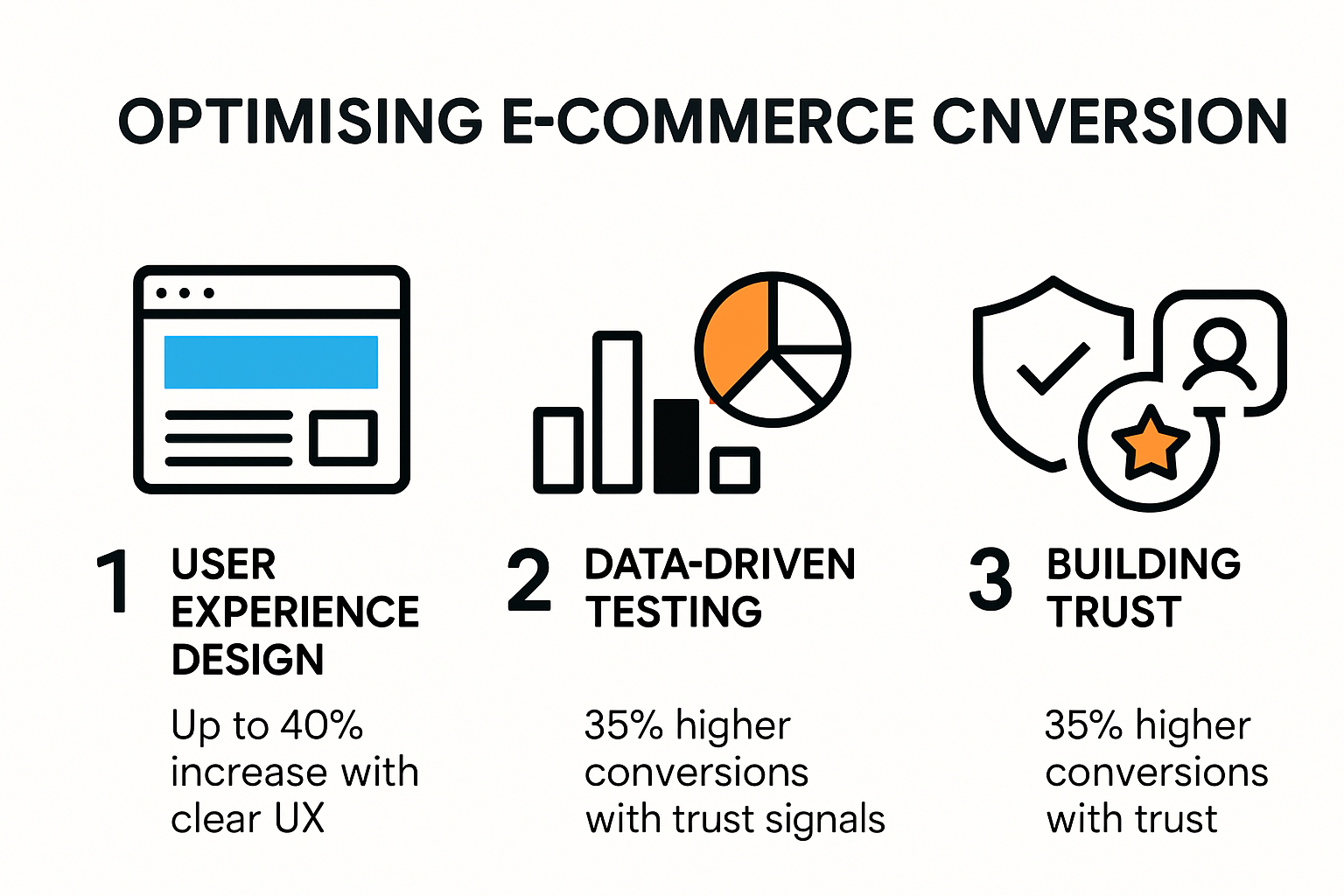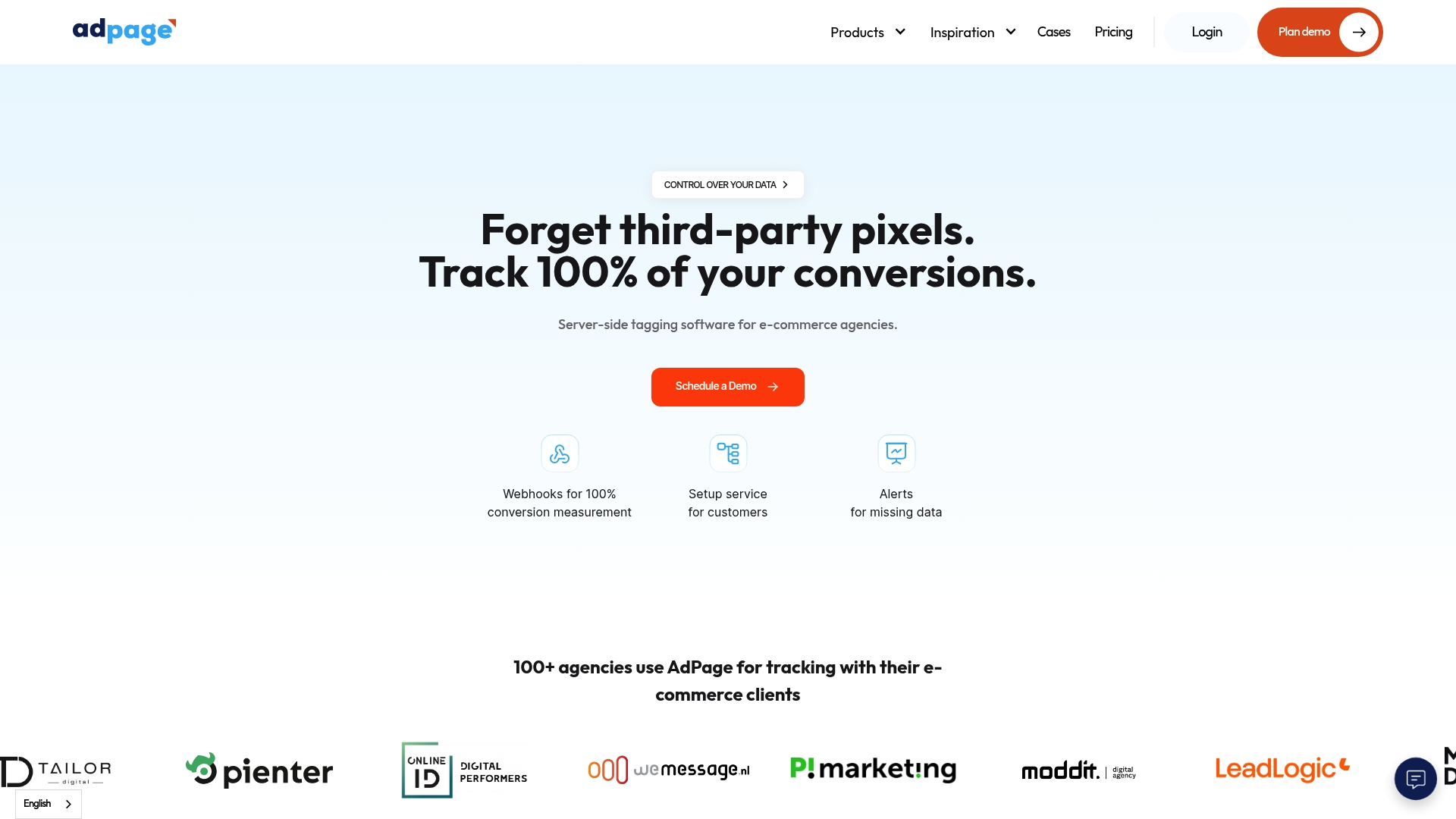Digital marketing has completely reshaped how businesses attract and keep customers online. The old spray and pray ad tactics are fading out fast, making way for strategies rooted in data and sharp targeting. Yet while everyone talks about brand awareness, the real secret is in precision and results tracking. Some companies are now delivering conversion rate improvements of up to 25 percent with robust performance marketing. Discover how the most successful brands are quietly turning clicks into loyal customers by rethinking the rules for digital growth.
Table of Contents
- Core Digital Marketing Strategies That Work
- Optimising Conversion Rates For E-commerce Success
- Leveraging Analytics For Informed Decisions
- Adapting Strategies For Freelancers And Agencies
Quick Summary
| Takeaway | Explanation |
|---|---|
| Focus on performance marketing metrics | Track key performance indicators like conversion rates to optimise your campaigns effectively. |
| Employ advanced audience segmentation | Tailor marketing messages to specific demographic groups for greater engagement and ROI. |
| Create a cohesive multichannel strategy | Ensure consistent messaging across channels to provide a seamless user experience. |
| Invest in user-centric website design | Enhancing user experience through design can significantly boost e-commerce conversion rates. |
| Leverage predictive analytics for strategies | Use data analytics to anticipate customer behaviors and optimise marketing efforts accordingly. |
Core Digital Marketing Strategies That Work
Digital marketing has transformed how businesses connect with their audiences, demanding strategic approaches that go beyond traditional advertising methods. The most effective digital marketing strategies combine data driven insights, targeted communication, and intelligent audience engagement.
Performance Marketing Fundamentals
Performance marketing represents a critical approach where marketers focus exclusively on measurable results. Learn more about campaign optimization strategies that drive tangible outcomes. According to McKinsey & Company, businesses that implement robust performance marketing techniques can see conversion rate improvements of up to 25%.
Key performance indicators become the cornerstone of these strategies. Marketers must track metrics like customer acquisition cost, return on advertising spend, and conversion rates with precision. This data driven methodology allows for continuous refinement and optimization of marketing campaigns.
Audience Segmentation and Personalisation
Successful digital marketing strategies recognise that one size does not fit all. Advanced audience segmentation enables businesses to create highly targeted messaging that resonates with specific demographic groups. Deloitte research suggests that personalised marketing campaigns can deliver five to eight times the return on investment compared to generic approaches.
Understanding audience behaviour requires sophisticated analytics and tracking tools. Marketers must leverage data from multiple touchpoints including website interactions, social media engagement, and email responses to create comprehensive user profiles. These insights allow for creating nuanced marketing messages that speak directly to individual customer needs and preferences.
Integrated Multichannel Approach
Modern digital marketing demands an integrated multichannel strategy where different platforms work synergistically. This means creating cohesive messaging across social media, email marketing, content marketing, and paid advertising channels. The goal is to create a seamless user experience that guides potential customers through the entire conversion funnel.
Successful multichannel strategies require sophisticated tracking and attribution models. Businesses must understand how different channels interact and contribute to the overall marketing performance. This holistic approach ensures that marketing budgets are allocated efficiently and each channel is optimised for maximum impact.
By implementing these core digital marketing strategies, businesses can create more effective, targeted, and measurable marketing campaigns that drive genuine growth and meaningful customer engagement.
Here is a summary table highlighting the core digital marketing strategies discussed, including their focus areas and main benefits:
| Strategy | Focus Area | Main Benefit |
|---|---|---|
| Performance Marketing | Results tracking & KPIs | Up to 25% improvement in conversion rates |
| Audience Segmentation & Personalisation | Demographic targeting | 5–8x higher ROI from personalised campaigns |
| Integrated Multichannel Approach | Cross-channel synergy | Consistent messaging, seamless user experience |
Optimising Conversion Rates for E-commerce Success
E-commerce success hinges on the ability to transform website visitors into paying customers. Conversion rate optimization represents a strategic approach to systematically improving the percentage of users who complete a desired action, whether purchasing a product, signing up for a service, or engaging with digital content.
User Experience and Website Design
The visual and functional design of an e-commerce website plays a critical role in conversion rates. Explore advanced conversion optimization techniques to enhance user engagement. According to research from the Nielsen Norman Group, websites with clear navigation, intuitive layouts, and seamless user interfaces can increase conversion rates by up to 40%.
Key design elements that drive conversions include responsive mobile design, fast loading speeds, clean visual hierarchies, and strategically placed call-to-action buttons. Reducing cognitive load for users means presenting information clearly, minimizing form fields, and creating a smooth path from initial interest to final purchase.
Data-Driven Conversion Optimization
Advanced e-commerce strategies leverage comprehensive data analysis to understand and predict user behaviour. A study from ERIC highlights the importance of systematic A/B testing and user behaviour tracking in refining conversion strategies. Sophisticated analytics tools enable marketers to track user interactions, identify drop-off points, and develop targeted interventions.
Precise tracking of key performance indicators such as cart abandonment rates, average time on site, and click-through rates provides actionable insights. Machine learning algorithms can now predict user behaviour, allowing businesses to create personalized experiences that significantly improve conversion potential.
Trust and Conversion Psychology
Building user trust represents a fundamental aspect of conversion optimization. Research from Harvard Business Review demonstrates that transparent pricing, clear return policies, and visible security credentials can increase conversion rates by up to 35%.
Psychological triggers like social proof, customer testimonials, secure payment badges, and transparent shipping information reduce user hesitation. Implementing trust signals throughout the user journey helps mitigate potential concerns and encourages users to complete their purchases.
Successful conversion rate optimization requires a holistic approach that combines technical precision, user-centric design, and a deep understanding of customer psychology. By continuously testing, measuring, and refining digital strategies, e-commerce businesses can transform casual browsers into committed customers.
This statistics table organises the key numerical findings related to e-commerce conversion optimisation, giving a clear view of their impact:
| Optimisation Area | Key Practice | Reported Improvement |
|---|---|---|
| Website Design | Clear navigation & UI | Up to 40% higher conversions |
| Conversion Psychology | Trust signals (badges, policies) | Up to 35% higher conversions |
| Performance Marketing | Robust techniques & tracking | Up to 25% higher conversions |
| Personalised Campaigns | Audience segmentation | 5–8x higher ROI |

Leveraging Analytics for Informed Decisions
Marketing analytics has emerged as a critical discipline that transforms raw data into strategic insights, enabling businesses to make precise, data driven decisions. By systematically collecting, measuring, and interpreting digital marketing performance metrics, organizations can unlock powerful strategies for growth and optimization.
Comprehensive Data Collection Strategies
Explore advanced analytics best practices to enhance your marketing intelligence. According to research from OpenStax, effective data collection involves gathering information from multiple touchpoints including website interactions, social media engagement, email campaigns, and customer relationship management systems.
Successful data collection requires implementing robust tracking mechanisms that capture granular user behaviors. This includes monitoring metrics such as page views, session duration, click-through rates, conversion paths, and user demographics. Advanced tracking technologies enable marketers to create comprehensive user profiles that reveal nuanced insights into customer preferences and journey stages.
Predictive Analytics and Decision Making
Digital marketing analytics represents a transformative approach to understanding customer behavior and predicting future trends. By applying sophisticated statistical models and machine learning algorithms, businesses can move beyond retrospective reporting to anticipatory strategy development.
Predictive analytics empowers marketers to forecast potential customer actions, identify emerging market opportunities, and optimize resource allocation. Techniques like regression analysis, clustering, and time series forecasting allow organizations to develop targeted marketing strategies with increased precision. These approaches help businesses understand not just what happened, but what is likely to happen in future marketing scenarios.
Performance Measurement and Continuous Optimization
Marketing analytics research highlights the importance of continuous performance measurement and iterative strategy refinement. Key performance indicators (KPIs) serve as critical benchmarks for evaluating marketing effectiveness, allowing teams to make data informed adjustments in real time.
Comprehensive performance measurement involves tracking metrics across multiple dimensions including customer acquisition cost, return on investment, conversion rates, and customer lifetime value. By establishing clear performance benchmarks and implementing systematic review processes, businesses can create a culture of continuous improvement and strategic agility.
Leveraging analytics is not merely about collecting data but transforming information into actionable strategies. Successful organizations recognize that data driven decision making requires a holistic approach combining technological sophistication, analytical expertise, and strategic vision. By embracing advanced analytics methodologies, businesses can develop more responsive, intelligent marketing approaches that drive sustainable growth and competitive advantage.
Adapting Strategies for Freelancers and Agencies
The digital marketing landscape presents unique challenges and opportunities for freelancers and agencies seeking to differentiate themselves in a competitive marketplace. Success requires a dynamic approach that combines technological proficiency, strategic positioning, and adaptive marketing techniques.
Strategic Positioning and Service Differentiation
Explore effective marketing approaches for professional services to enhance your market presence. According to research from the University of Southern Mississippi, successful digital marketing strategies for small businesses and independent professionals demand a clear understanding of technological adoption and client expectations.
Freelancers and agencies must develop a unique value proposition that clearly communicates their expertise and differentiates them from competitors. This involves creating targeted service packages, developing specialized niche expertise, and demonstrating measurable results through comprehensive case studies and client testimonials. Effective positioning requires a deep understanding of target market needs and the ability to articulate precise solutions to specific business challenges.
Digital Marketing Technology and Skill Development
Digital marketing research highlights the critical importance of continuous technological adaptation for professional service providers. Successful freelancers and agencies invest in ongoing skill development, mastering emerging digital marketing tools, analytics platforms, and communication technologies.
Key technological competencies include advanced data analysis, automation tool proficiency, artificial intelligence integration, and cross-platform marketing strategies. Professionals must develop a comprehensive digital toolkit that enables efficient service delivery, precise client communication, and sophisticated performance tracking. This technological proficiency allows for more agile, responsive, and data driven marketing approaches.
Building Sustainable Client Relationships
Research from the Library of Congress emphasizes the importance of relationship building in the modern digital marketing ecosystem. Successful freelancers and agencies move beyond transactional service models to develop long term strategic partnerships with clients.
Effective relationship management involves transparent communication, consistent performance reporting, and proactive strategy recommendations. Professionals should leverage digital platforms to maintain regular client engagement, share industry insights, and demonstrate ongoing value. By positioning themselves as strategic partners rather than mere service providers, freelancers and agencies can create more stable, profitable, and mutually beneficial professional relationships.

Navigating the digital marketing landscape requires a holistic approach that combines technological expertise, strategic thinking, and client-centric service models. Freelancers and agencies who can adapt quickly, demonstrate clear value, and maintain technological relevance will be best positioned to thrive in an increasingly competitive digital marketplace.
Frequently Asked Questions
What are the key digital marketing strategies for improving conversion rates?
To improve conversion rates, focus on performance marketing metrics, advanced audience segmentation, and creating a cohesive multichannel strategy. These approaches ensure that marketing efforts are targeted and highly measurable.
How can audience segmentation enhance digital marketing performance?
Audience segmentation allows businesses to tailor their marketing messages to specific demographic groups, leading to greater engagement and often a return on investment that is five to eight times higher compared to generic messaging.
What role does user experience and website design play in e-commerce success?
User experience and website design are crucial for e-commerce success; they can increase conversion rates by up to 40% when websites feature clear navigation, intuitive layouts, and responsive designs.
How can data-driven analytics improve marketing decisions?
Data-driven analytics enable businesses to collect, interpret, and leverage digital marketing performance data, allowing them to make informed, strategic decisions that enhance marketing effectiveness and drive growth.
Transform Your Data Into Higher Conversions with AdPage
Struggling to turn visitors into loyal customers despite implementing the latest digital marketing strategies? You are not alone. The core challenge highlighted in this article is the need for accurate conversion tracking and actionable data to make sense of your campaign performance. Many businesses face issues with data loss from browser restrictions, unreliable analytics, and difficulties in tracking the true impact of their marketing efforts. This causes missed opportunities and wasted ad spend, especially when so much depends on robust attribution and precise insights.

AdPage offers a solution built for results-driven marketers and agencies who are ready to unlock the power of server-side tagging. With consent management and real-time reporting, you can monitor 100% of your conversions and overcome data gaps holding back your growth. Seamless integrations with Shopify, WooCommerce, and Magento make implementation simple, while GDPR-ready features keep your business compliant.
Ready to see your efforts reflected in reliable numbers, not lost in the noise? Visit AdPage’s main site now to discover how you can optimise conversion tracking for your e-commerce business. Take control of your marketing data and start maximising your conversion rate today.



.png)
